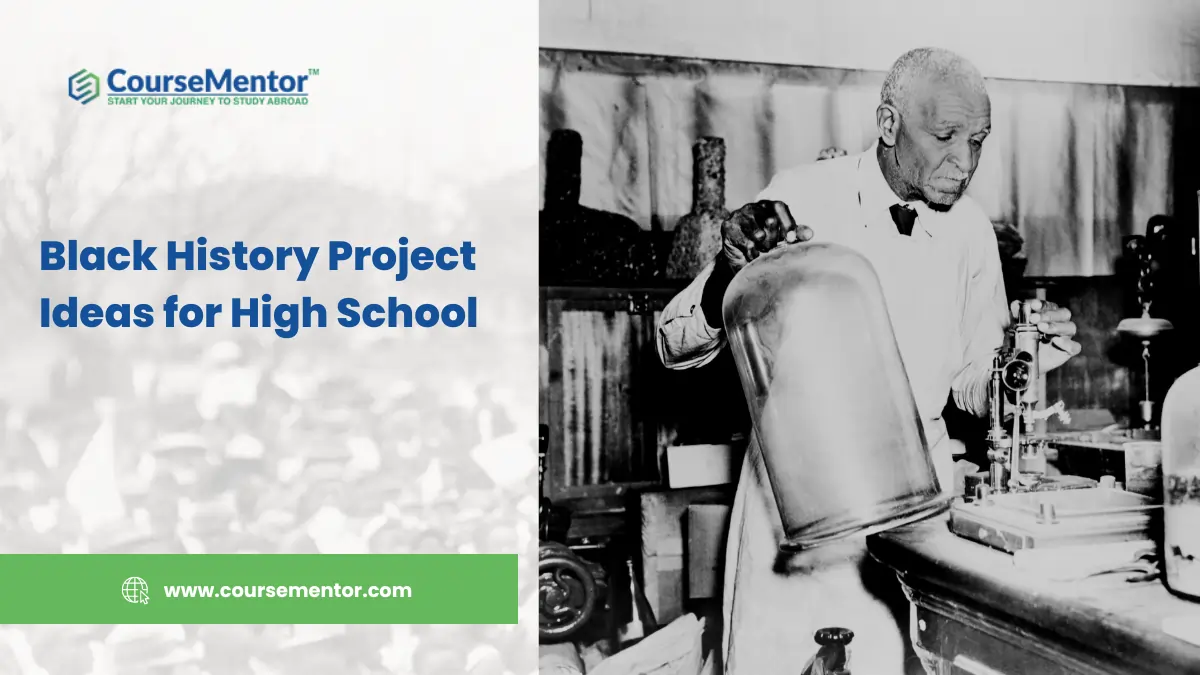February is Black History Month. It is a time to learn about the triumphs of African Americans. Schools should do projects to teach students this critical history that isn’t always in textbooks. High schoolers can better learn Black history and culture by doing practical projects.
This blog will share cool ideas for Black History Month projects for high school students who want to learn. Students will enjoy being creative while learning about influential Black scholars, inventors, artists, and activists.
These activities will allow students to learn about black history in deep. So why wait any longer? Let’s explore further in this blog.
Interesting Black History Project Ideas for High School
Here are the top black history project ideas for high school in 2024.
History and Politics
- Make a timeline of important events in the Civil Rights Movement.
- Study and talk about less-known people from Black history.
- Look at how past Black leaders influenced today’s politics.
- Learn about Black soldiers in different wars.
- See how Black activists have helped social justice causes.
- Check out the history of businesses owned by Black people.
- Talk about important Black landmarks in your area.
- Look into how segregation in the past still affects society today.
- Compare how different Black activists tried to make changes.
- Learn about the role of Black women in voting and women’s rights.
- See how Black musicians helped during the Civil Rights time.
- Talk about how Black history is shown in books and movies.
Also Read: 43+ Latest Social Media Research Topics for College Students
Arts and Culture
- Make a presentation about how Black music has changed over time.
- Look at how Black artists helped different art movements.
- See how Black people are shown in movies and TV.
- Learn about Black theater and the people who write plays.
- Check out how African art has influenced art in America and Europe.
- Talk about how Black athletes helped to end racial divides in sports.
- Make a timeline of popular Black fashion trends.
- Learn about how Black food has become part of American culture.
- See how Black identity is shown in books written today.
- Celebrate different Black festivals and traditions.
- Check out how Black photography helped during social movements.
- Look at how Black people have influenced dance and theater.
Science and Innovation
- Learn about Black scientists and inventors from history.
- See how Black scholars helped medical research.
- Learn about Black people’s role in exploring space and stars.
- Look at how Black engineers made technology better.
- See how Black people are doing in science and math jobs.
- Learn about how pollution affects Black neighborhoods.
- Check out colleges made for Black students and how they help in science.
- Learn about Black people who are good at math.
- See how Black inventors made things we use every day.
- Learn about Black architects who helped to build cities.
- Look at how Black people helped make farming better.
- Learn about Black people who help us stay healthy.
- Literature and Language
- Explore books by Black authors that talk about race and identity.
- Look at how Black writers use different kinds of language in their books.
- Learn about newspapers and writers who tell stories about Black communities.
- Check out how Black poets have made American poetry special.
- See how Black characters are shown in old books.
- Learn about writers from the Harlem Renaissance.
- Look at how Black people tell stories and pass them down.
- See how Black people talk in movies and books.
- Learn about plays written by Black writers.
- Study books that talk about the civil rights time.
- Check out how new books talk about justice and change.
- Learn about how Black writers changed American culture.
Education and Social Sciences
- Learn about schools made for Black students.
- See how well plans to mix different races in schools worked.
- Look at how schools teach Black history.
- Learn about Black students in mostly white schools.
- See how teachers try to make schools fair for everyone.
- Learn about how separating students by race still affects learning today.
- Look at how schools talk about different cultures.
- Study how Black students fight for their rights in colleges.
- See how hard it is for Black students to attend college.
- Learn about how money and race affect education.
- Check out new ways to teach Black history.
- See how teaching about Black culture helps students improve in school.
Health and Wellness
- Look at how sick Black people get care that is different from others.
- Learn about times when Black people were used for medical tests.
- See how being mistreated affects Black people’s minds.
- Learn about Black doctors who help in Black communities.
- See how Black people use old ways to stay healthy.
- Learn about how being Black affects having babies.
- Look at how Black health problems are shown in the news.
- Study how not having enough food affects Black health.
- Learn about groups that help Black people get healthy.
- See how Black people help moms before and after babies are born.
- Check out how Black people think about health care.
- Study how being maltreated stops Black people from getting care.
Business and Economics
- Learn about Black people who start businesses in America.
- See how racism stops Black people from getting good jobs.
- Study how businesses owned by Black people help neighborhoods.
- Look at how hard it is for Black people to get money to start businesses.
- Learn about banks made for Black people.
- See how Black people are shown in ads.
- Learn about Black people who help make money rules.
- Study how changing neighborhoods affect Black businesses.
- Look at how Black people invest money.
- Learn about Black people who are good at running businesses.
- See how TV and movies talk about Black people and money.
- Look at groups that help Black people do better in business.
Sports and Athletics
- Learn about Black people in different sports leagues.
- See how being treated unfairly affects Black athletes.
- Study how Black coaches help teams.
- Look at how Black women do in sports.
- Learn about Black people in the Olympics.
- See how Black athletes are talked about in the news.
- Study how Black athletes help kids.
- Learn how hard it is for Black athletes to get into college.
- See how Black athletes talk about race.
- Learn about how Black athletes are in video games.
- Study how sports help Black neighborhoods.
- Learn about how Black colleges help athletes.
It’s time to learn how you will write a black history project report perfectly.
How To Write A Black History Project Report?
Check out the steps to write a Black History report.
- Choosing a Topic
When starting your report, pick a good topic that you love. Some ideas include a historical figure, civil rights, black soldiers, or black inventors.
- Researching
Look for information in books, articles, videos, museums, and websites. You can also take detailed notes and write down your sources.
- Making an Outline
Make sure to write an outline with intro, background, body, and conclusion sections. This gives structure to your project.
- Writing Intro and Conclusion
The intro gives background and focus to your project. The conclusion summarizes the main points and importance.
- Writing the Body
Use your outline to expand on body paragraphs. It is wise to focus on one idea per paragraph with research evidence.
- Revising and Proofreading
Finally, review your draft to improve flow and fix errors. Don’t forget to polish the final draft for a good grade.
Following these steps can help you make a great black history project report. Let your interests guide you as you research and write.
Challenges And Solutions Of Every Black History Project
Here are the Challenges every student faces with their solutions.
Challenges:
- Finding an interesting, unique topic or person to research beyond famous figures.
- Accessing good sources and in-depth information beyond basic online searches.
- Presenting the information engaging and creatively beyond a standard paper or poster.
- Managing time wisely and staying organized with all the research involved.
- Overcoming frustration when the project feels overwhelming or tedious.
Solutions:
- Brainstorm creative topics and people by asking parents, teachers, and librarians for suggestions.
- Use libraries, books, documentaries, museums, and academic journals for reliable, detailed content.
- Try interactive timelines, videos, photo essays, artwork, or songs to bring the topic to life.
- Break the project into steps; set regular work times; organize notes and citations.
- Push through challenges, celebrate small milestones, and maintain motivation.
- Tap into available help; pursue engaging presentation methods; budget time wisely.
- Believe in abilities to complete a rewarding project with lasting value.
How You Can Make Black History Every Day? (Beyond February)
Black History Month is great, but learning about Black history shouldn’t be limited to just February. Here are some ideas for how to keep engaging with Black history all year long:
1. Watch films and documentaries – Movies like “Hidden Figures” and “I Am Not Your Negro” help connect to the past. Keep a list of movies to see all year round.
2. Listen to podcasts – Podcasts such as “1619” and “Still I Rise” deeply delve into Black history and culture. Subscribe for constant learning on the go.
3. Visit museums and historical sites: Locations like the National Museum of African American History and Culture and places with historic significance keep Black stories alive. Planning a visit helps you to know more.
4. Support Black businesses: Shop at local businesses owned by Blacks to contribute towards community economic empowerment. Make a resolve to buy locally.
5. Follow Black change-makers on social media – People who have made changes while participating in activities share their understanding on platforms like Instagram or Twitter. Widen your feed.
6. Attend cultural events: Find exhibitions, speakers, performances, or festivals that celebrate black culture happening where you live. Highlight important dates on your calendar.
7. Explore your heritage – Ask older relatives about your ancestry. Look up your family tree and lineage online. Discover what is special about you.
8. Teach others: Pass on information about what you’ve learned to friends or students from class. Promote comprehension plus introduce discussions relating to black history into our daily interactions.
As we all know, black history is American history. There are so many ways to honor it beyond February. Keep asking questions, listening, learning, and growing all year long. Our understanding of history is never finished.
Summary
The importance of black history in American society is simply indescribable. African Americans have greatly influenced the USA, from politics and civil rights to music, sports, and popular culture.
The several projects we did showed us a picture of the difficulties, success stories, and input of black people into life. In summarizing this study on black history and culture, one can realize that this ethnic group is powerful and patriotic, as it helped make America what it is today.
However, there are still some hurdles to overcome, although things look ahead. If we gain wisdom from past occurrences, we can create a more fair and all-embracing society.
FAQs
What are the latest Black history topics?
1. Civil Rights Movement
2. Slavery and Abolition
3. Harlem Renaissance
4. African History and Diaspora
5. Black Achievements in Science, Medicine, and Technology
6. Black Music and Dance
7. Black Women’s History
8. Black LGBTQ+ History
Are there any innovative formats for presenting Black history projects beyond traditional essays or posters?
Students can opt for spoken word performances, podcasts, or virtual reality experiences to offer dynamic and immersive perspectives on Black history.
How can students ensure their Black History projects are culturally sensitive and respectful?
Prioritize thorough research, sensitivity readers, and consulting with community leaders to ensure accurate representation and avoid perpetuating harmful.





